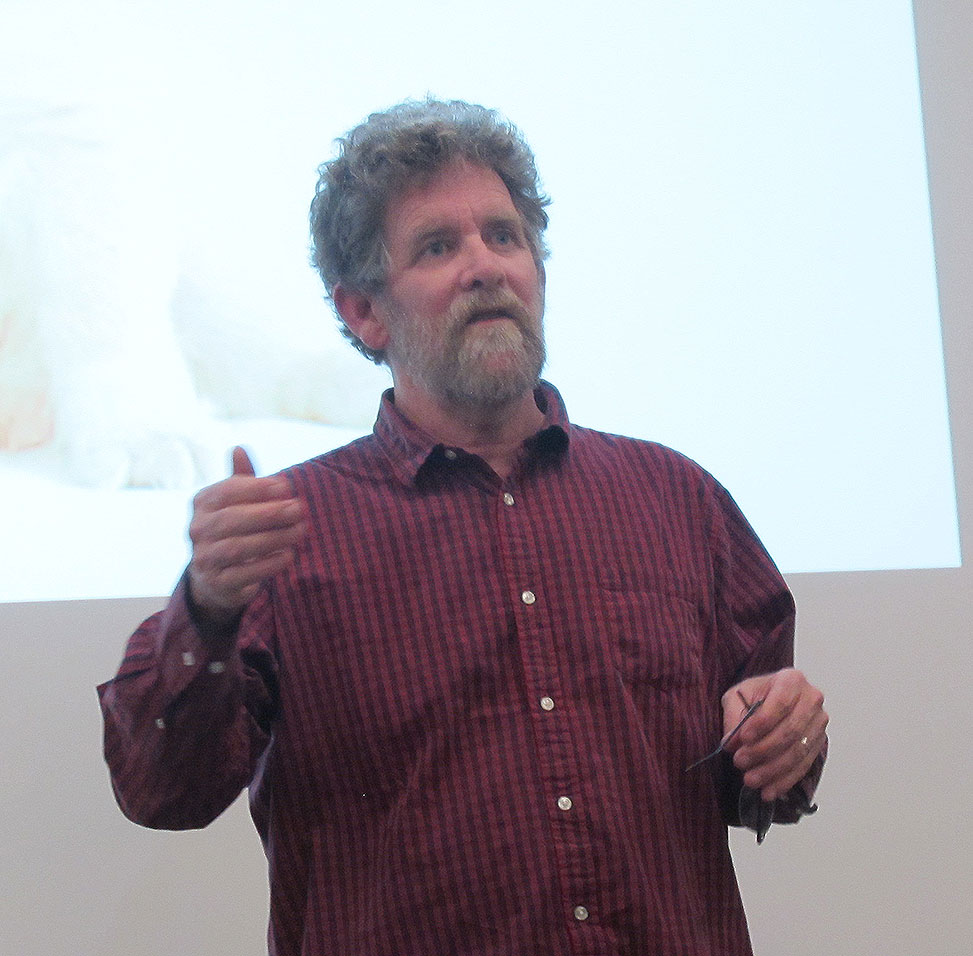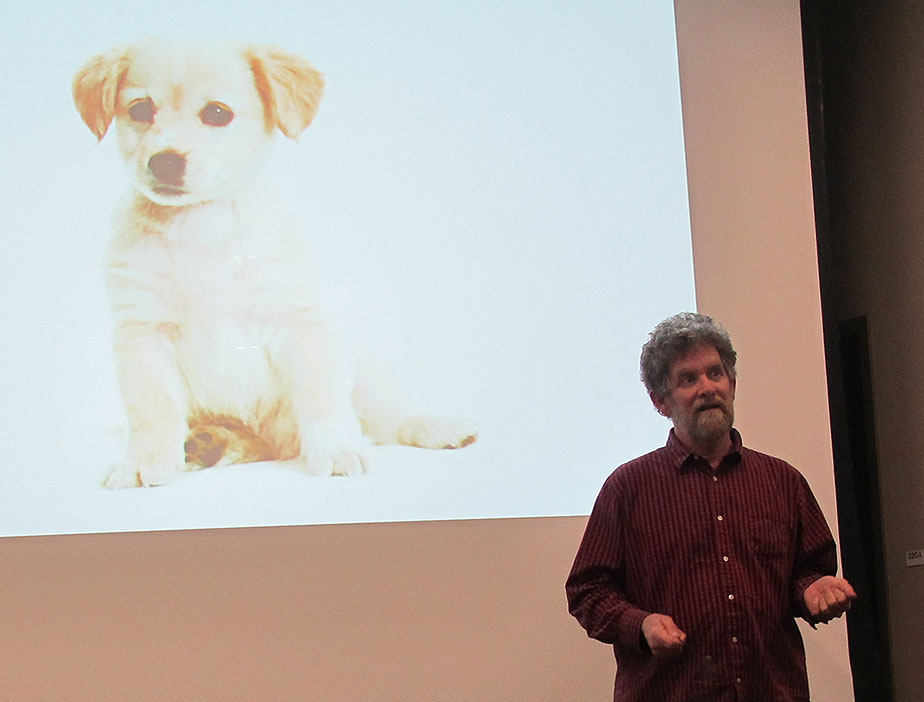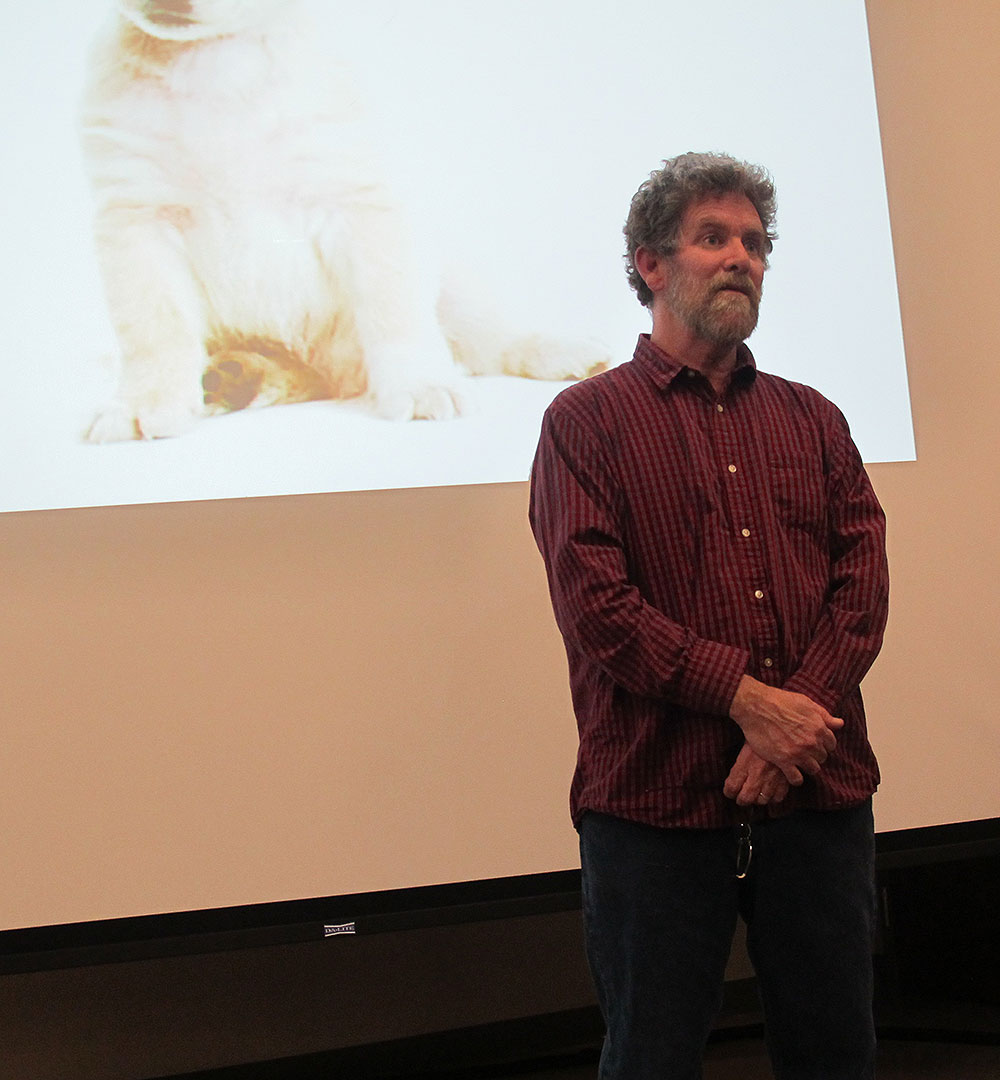Editorial cartoonist Bennett: ‘Offending for the right reasons’

Pulitzer Prize-winning cartoonist Clay Bennett entertained, provoked reactions and sparked conversation during his talk to students Wednesday afternoon — exactly the goal of any effective editorial cartoon.
Bennett, who works for the Chattanooga Times Free Press, spoke to professor of practice Tom French’s Behind the Prize class, which brings to campus journalists who have won Pulitzers or other prestigious awards, as well as those who have been finalists.
Bennett has been in the editorial cartooning business for more three decades, through six presidencies and five different states. He’s been a finalist for the Pulitzer Prize for editorial cartoons six times and he won the award in 2002.
These accolades don’t exactly get him high praise from his conservative readership in Tennessee. But he’s more than happy with that.
“Apologies if anyone is offended,” he said before showing slides of his cartoons. “But if none of you are offended, I am really sorry because it is a sign I am doing something really wrong.”
The cartoons themselves are accessible but biting, like a “vicious sock puppet,” according to Bennett. His cartoons purposefully don’t feature prominent faces. Instead, he’d rather draw about inflammatory positions or ideas.

One cartoon featured a panhandler holding up a “Former Fetus” sign. Another showed “The Tea Party” tearing apart a ship christened “America.” “We aint testing nobody that don’t speak good English,” noted another cartoon, this one about a new Tennessee voting law.
His cartoons, noted by Bennett to be pretty liberal, typically don’t go over well in most conservative regions. During a presentation at the Texas Press Association in the early 2000s, he showed a room full of conservative publishers his work. When the lights came up, half of the audience had disappeared.
“It was humbling, if not downright humiliating,” he said. “Even an optimist would have been discouraged.”
But challenging opinions drive his willingness to work.
Before he moved to Tennessee to work for the Times Free Press, Bennett worked for the Christian Science Monitor in Boston. While about 10 percent of his cartoons were rejected by his editors, the general politics of Boston largely aligned with his own.
Ultimately, that drove him to move away.
“I was just bored living in the progressive Northeast,” he said. “At its core, editorial cartooning is a negative art form, based on anger and fueled by discontent and alienation. It’s hard to work up righteous indignation in progressive Massachusetts. Tennessee has been a welcome relief from all that. I am so discontent and so alienated I just don’t think I could be any happier.”
After more than seven years of reading Bennett’s work, readers in the conservative Southern state are “starting to warm up” to him, he said.
“If loathing and contempt are words you would use to describe that,” he joked. “Even if my readers don’t pay me any respect, they do pay a lot of attention.”
He hefted up a manila folder labeled HATE MAIL (“I’m a cartoonist, I label everything.”), chock full of notes from his readers in the past few months. His favorites are the clipped out cartoons with messages from discontented readers scrawled all over them.
One he pulls out has a note that reads “Lacking style or good taste, tawdry, distasteful, offensive,” pointing to a sign that says “Republic Inn.” On the bottom, it calls him a “fair” artist, though it is quickly followed by other not so friendly notes.
“What! Fair?” he exclaimed. “If you are going to hate someone, hate them all the way.”
It’s not all hate, he said, as he does have a few fans even in conservative Tennessee.
“Forty-five percent of us voted for Obama,” he said. “We have to have a voice, too.”
But responses to his work can get intense. He’s been threatened before, he said, though no one has ever made any moves to act on their threats.
This discussion about opinionated readers naturally led to questions about the recent events in Paris at Charlie Hebdo and the shooting deaths of 11 journalists who worked at the publication.
“The Charlie Hebdo guys knew what they were doing,” Bennett said, noting that the magazine had been firebombed before. “They made the point that they would rather die standing than live on their knees, and you got to admire that.”
He doesn’t necessarily like their cartooning style.
“I think their cartoons are juvenile and sophomoric in many ways,” he said. “A guy giving a middle finger is not very subtle or nuanced, but I guess it expressed a point of view.”
But he understood completely why they hadn’t been cowed into submission before or even now.
“If someone told me ‘Quit what you’re doing or I’ll kill you,’ I wouldn’t quit what I was doing,” he said. “I can’t imagine a life without cartoons.”

Part of cartooning to Bennett is “offending for the right reasons.” Sometimes things can be taken out of context, he said. If you draw a cartoon about anti-sexism or anti-racism but women and African-Americans get upset, something went wrong. But generally, a cartoonist can’t think too hard about accidentally crossing the line.
“If there’s 42 people in this room, there are 42 different scales of what would ‘cross the line,’” he said. “If we always tried to not cross the line, the scale of what we could draw would get narrower and narrower.”
He’s upfront about his politics, and while a natural comedian, he takes the job seriously.
“Cartooning is how I communicate,” Bennett said. “I care about the world, politics—this is just the way I communicate what I’m feeling.”
Students laughed often during the presentation and asked many questions about the nature and future of cartooning.
“It was a very entertaining presentation,” said sophomore Anna Boone, graphics editor of the Indiana Daily Student. “A lot more colorful than I was expecting, which I liked.”
But while Bennett is self-deprecating about the effect of change his cartoons have in Tennessee, he believes in the positive power of today’s shifting attitudes.
When he was growing up, he said, his friends who were gay couldn’t even come out—not to parents, friends or anyone. It was only those who were willing to speak out, like San Francisco politician Harvey Milk, who helped create positive change for LGBT people in America, he said. He sees the gay rights movement as an example of the “changing heart” of America, affected by outspoken people.
“It’s your generation and hopefully mine that changed the heart of America,” he said. “The arc of the moral universe is bending.”

